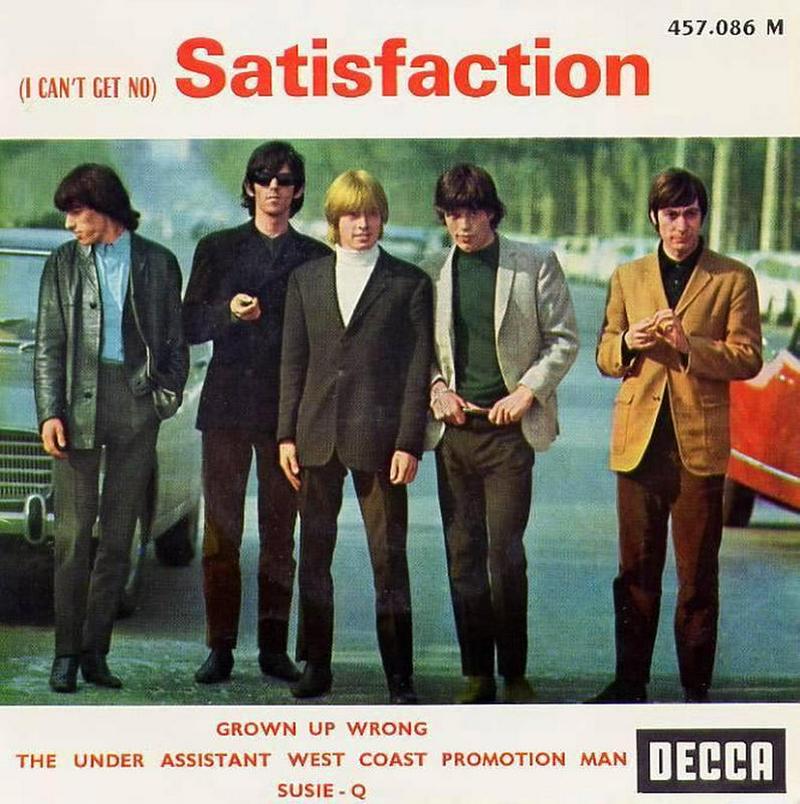How The Rolling Stones’ “I Can’t Get No Satisfaction” Was Made In America
By | February 23, 2022

The Rolling Stones’ “I Can’t Get No Satisfaction” made the band overnight stars in America and continued to distinguish the boys from London, long into their golden years. Incredibly it all started with a Keith Richards’ dream after unruly fans cut their performance short in Clearwater, Florida.
In a hotel now owned by Scientologists, Richards awoke from a dream and groggily fired off a guitar riff into a recorder before promptly passing out. Reportedly, the tape concluded with the sounds of his snoring. From planting their flag in America to finishing with a flourish at the Superbowl, this is the story of “I Can’t Get No Satisfaction.”

A Rolling Stone Pillar
Obviously, today the Rolling Stones rank highly in the pantheon of rock n roll legends. However, in the summer of ‘65, they were still on their way up. No one puts the legacy and importance of “I Can’t Get No Satisfaction” better than frontman Mick Jagger:
"People get very blasé about their big hit. It was the song that really made The Rolling Stones, changed us from just another band into a huge, monster band. You always need one song. We weren't American, and America was a big thing and we always wanted to make it here. It was very impressive the way that song and the popularity of the band became a worldwide thing. It's a signature tune, really, rather than a great, classic painting, 'cause it's only like one thing - a kind of signature that everyone knows.

From Dream To Jewel
After Richards brought in his late-night inspiration, the rest of the band immediately liked it but the author wasn’t sold. As Jagger said in ‘68, "It sounded like a folk song when we first started working on it and Keith didn't like it much, he didn't want it to be a single, he didn't think it would do very well. I think Keith thought it was a bit basic. I don't think he really listened to it properly. He was too close to it and just felt it was a silly kind of riff."
Obviously, the rest of the band overruled the preeminent guitarist because, within an astounding six days, the final take was recorded. Just another two weeks later it became a massive hit in America. “I Can’t Get No Satisfaction” spent four weeks at #1 before The Walker Brothers’ "Make It Easy on Yourself" took the crown.

Perfect Timing
The serendipity of Richards' revelatory dream occurring while the band was touring in America dramatically fueled the fire of their popularity. They even held the song back in the UK because they didn’t want to release a song there while touring in the US.
Nevertheless, the song and the band caught fire in the UK anyway. In a move befitting their name, the band kept rolling in the US by writing new singles and returning England to a new level of fanfare.

Vital Fuzz Box
While Jagger wrote all the lyrics besides the indelible "Can't Get No Satisfaction," Richards struggled with the proper sound. Initially, Richards thought of using horns. After toying with the nearly unheard of Gibson Fuzz Box, he and the band agreed they found a vibe. Richards related his experimentation with the iconic fuzz box:
"It was the first one Gibson made. I was screaming for more distortion: This riff's really gotta hang hard and long, and we burnt the amps up and turned the s--t up, and it still wasn't right. And then Ian Stewart went around the corner to Eli Wallach's Music City or something and came around with a distortion box. Try this. It was as off-hand as that. It was just from nowhere. I never got into the thing after that, either. It had very limited use, but it was just the right time for that song."

Commercial Appeal
Despite the song openly mocking commercialism with the line, "When I'm watchin' my TV, and that man comes on to tell me how white my shirts can be..." the song turned into a cash cow. Ironically, the band didn’t own the publishing rights to their enduring hit. In a move to avoid the British taxman, they signed a deal with a devil of sorts - an American lawyer. Allen Klein used some creative accounting maneuvers but ended up controlling much of the band's money.
In order to extract themselves from the deal, they signed over the publishing rights to their catalog up until ‘69! However, it didn’t mean they didn’t get paid for its use; they just lost control of how the songs were used. For instance, when Klein signed a $4 million deal with Snickers for use of the song in a commercial, Jagger and Richards received $2.8 million of that total. Ironically, Snickers paid all that money but failed to secure the original song. A studio band provided the sound for that ‘91 commercial. “Can’t Get No Satisfaction” indeed.
